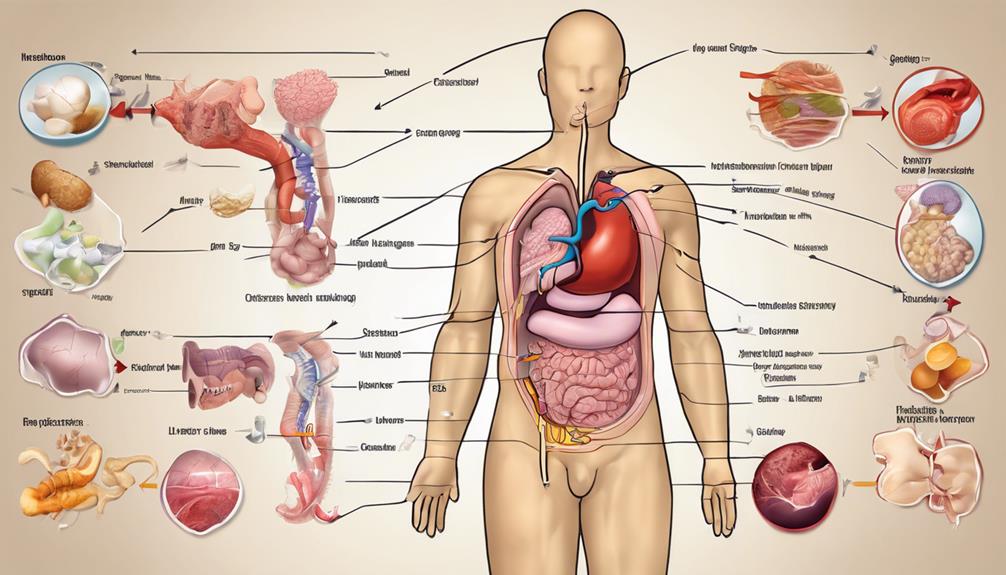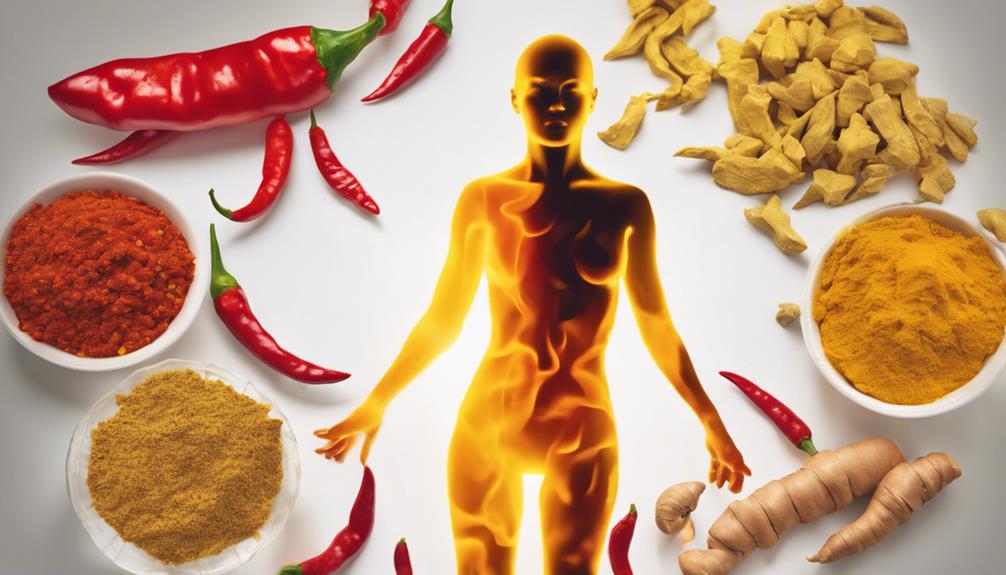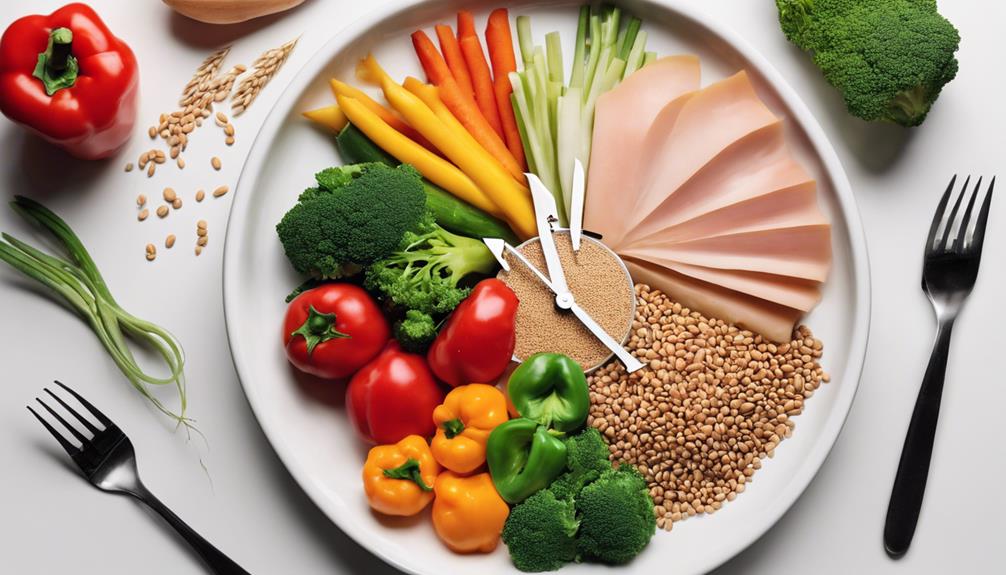How to Boost Your Metabolism
Did you know that certain foods can actually increase your metabolism simply by consuming them? Understanding how your body processes foods can be key to optimizing your metabolic rate. By making some strategic choices in your diet, you can potentially give your metabolism a natural boost that supports your overall health and weight management goals.
Key Takeaways
- Stay hydrated for optimal metabolic function and energy.
- Engage in strength training to build muscle and increase metabolism.
- Incorporate high-intensity interval training for calorie burn and fitness.
- Consume protein evenly throughout the day for muscle repair.
- Manage stress through relaxation techniques to lower cortisol levels.
Understanding Metabolism Basics
To understand metabolism basics, let's break it down into simple terms. Your body is a remarkable machine constantly burning calories to keep you going. This calorie burning process is what we refer to as metabolism. It involves a series of chemical reactions that occur within your cells to convert the food you eat into energy.
One crucial aspect of metabolism is the digestive process. When you eat, your body breaks down food into nutrients like carbohydrates, proteins, and fats. These nutrients are then absorbed into the bloodstream and transported to your cells to provide energy for various bodily functions.
Understanding your metabolism can help you make informed decisions about your diet and lifestyle. By optimizing your digestive process through healthy eating habits and regular physical activity, you can support your body's calorie burning mechanisms. Remember, small changes can make a big difference in how efficiently your metabolism functions. Stay mindful of what you eat and stay active to keep your metabolism in top shape.
Importance of Hydration
Staying hydrated is crucial for maintaining optimal bodily functions. Water is essential for the transportation of nutrients, regulation of body temperature, and overall metabolism. But it's not just about drinking any liquid; the quality of what you consume matters. Proper hydration helps maintain electrolyte balance, ensuring that essential minerals like sodium and potassium are at the right levels for your body to function efficiently.
Dehydration can lead to imbalances in electrolytes, which may cause muscle cramps, fatigue, and even confusion. By drinking enough water, you can prevent these issues and support your metabolism.
Additionally, staying hydrated can help with water retention. It might sound counterintuitive, but when your body senses it's not getting enough water, it holds on to what it has, leading to bloating and discomfort. Drinking an adequate amount of water signals to your body that it's okay to release excess fluids, reducing water retention and promoting a leaner physique.
Power of Strength Training
Amidst the myriad of strategies to rev up your metabolism, one powerful tool stands out: strength training. When it comes to boosting your metabolism, incorporating muscle-building exercises through resistance training can yield significant benefits. Here's why you should consider adding strength training to your routine:
- Muscle Building: Engaging in strength training helps build lean muscle mass, which boosts your metabolism as muscle burns more calories at rest.
- Calorie Burn: Resistance training sessions can lead to an "afterburn" effect, where your body continues to burn calories post-workout to repair and build muscle.
- Metabolic Rate: Regular strength training can increase your basal metabolic rate, allowing you to burn more calories throughout the day.
- Bone Health: Strength training not only improves muscle strength but also enhances bone density, reducing the risk of osteoporosis.
- Functional Strength: Building muscle through resistance training enhances overall strength, making daily activities easier and reducing the risk of injuries.
Incorporating strength training into your fitness regimen can be a game-changer for revving up your metabolism and improving your overall health.
Incorporating High-Intensity Interval Training
Amid your journey to boost your metabolism through strength training, another effective method to consider is incorporating High-Intensity Interval Training (HIIT). HIIT involves short bursts of intense exercise followed by brief rest periods. This type of workout not only helps in burning calories during the session but also continues to burn calories post-workout, leading to an increased metabolic rate over time.
When it comes to cardio benefits, HIIT shines by improving cardiovascular health, increasing endurance, and boosting overall fitness levels. Research shows that HIIT can be more effective in improving aerobic capacity compared to steady-state cardio.
Additionally, HIIT is known for delivering quick results. Due to the high-intensity nature of the workout, it can help you achieve your fitness goals in a shorter amount of time compared to traditional steady-state cardio exercises.
Incorporating HIIT sessions into your routine a few times a week can significantly impact your metabolism and overall fitness level, making it a valuable addition to your workout regimen.
Prioritizing Protein Intake
To optimize your metabolism and support your fitness goals, prioritizing protein intake is essential. Protein plays a crucial role in boosting metabolism, preserving muscle mass, and aiding in weight loss. Here are some practical tips to help you make the most of your protein intake:
- Protein Sources: Incorporate a variety of protein sources into your diet such as lean meats, poultry, fish, eggs, dairy, legumes, and plant-based options like tofu and tempeh.
- Meal Timing: Distribute your protein intake evenly throughout the day by including protein-rich foods in every meal and snack. This helps maintain muscle protein synthesis and keeps your metabolism active.
- Consider Protein Supplements: If you struggle to meet your protein requirements through whole foods alone, consider adding protein supplements like protein powders or bars to your diet.
- Post-Workout Protein: Consuming protein after a workout can help repair and build muscle tissue. Aim to have a protein-rich snack or meal within 30 minutes to an hour after exercising.
- Hydration: Remember to stay hydrated when increasing your protein intake. Water is essential for digestion and overall metabolic function.
Benefits of Green Tea
Green tea is a popular beverage known for its numerous health benefits, including its potential to boost metabolism and aid in weight management. One of the key reasons green tea is beneficial for weight loss is its high antioxidant content. Antioxidants help combat free radicals in the body, which can contribute to inflammation and weight gain. Green tea contains catechins, a type of antioxidant that has been shown to increase metabolism and promote fat loss.
Studies have suggested that the catechins in green tea can help enhance the body's ability to burn fat, particularly during exercise. Additionally, green tea has been linked to a modest reduction in body weight and waist circumference. Incorporating green tea into your daily routine can be a simple and effective way to support your weight loss goals.
To reap the benefits of green tea for weight loss, aim to drink 2-3 cups daily. Remember to enjoy it without added sugar or high-calorie sweeteners to maximize its effectiveness.
Getting Sufficient Sleep
As you continue on your journey towards boosting your metabolism and achieving your weight loss goals, one often overlooked yet significant factor to consider is the importance of getting sufficient sleep. Sleep quality and duration play a crucial role in regulating your metabolism and overall health. Here are some key points to keep in mind:
- Aim for 7-9 hours: Strive to get between 7 to 9 hours of quality sleep each night.
- Consistent sleep schedule: Try to go to bed and wake up at the same time every day to support your body's natural rhythm.
- Create a relaxing bedtime routine: Wind down before bed with calming activities like reading or meditating to improve sleep quality.
- Avoid stimulants: Limit caffeine and electronic devices before bedtime to ensure better sleep quality.
- Optimize your sleep environment: Make your bedroom a comfortable, dark, and quiet space to promote restful sleep.
Prioritizing sufficient sleep is a simple yet powerful way to boost your metabolism and support your weight loss journey.
Managing Stress Levels
Stress management is a critical component of optimizing your metabolism and overall well-being. When stress levels are high, it can negatively impact your body's ability to burn calories efficiently. Incorporating meditation techniques, relaxation techniques, mindfulness practices, and deep breathing strategies into your daily routine can help combat stress and support a healthy metabolism.
Here is a simple table to highlight some effective stress management techniques:
| Technique | Description | Benefits |
|---|---|---|
| Meditation Techniques | Focus on calming the mind and promoting | Reduces cortisol levels |
| relaxation through guided meditation sessions | and improves mental clarity | |
| Relaxation Techniques | Engage in activities like yoga, tai chi, or | Lowers heart rate and blood |
| progressive muscle relaxation to unwind | pressure, promoting relaxation | |
| Mindfulness Practices | Stay present in the moment, observe thoughts | Reduces anxiety and stress |
| without judgment, and cultivate awareness | levels | |
| Deep Breathing Strategies | Practice deep breathing exercises to | Calms the nervous system and |
| reduce stress and promote relaxation | enhances focus and clarity |
Incorporating these techniques into your daily routine can help you manage stress effectively and support a healthy metabolism.
Impact of Spicy Foods
When looking to boost your metabolism and support overall health, incorporating spicy foods into your diet can have a significant impact. Spice tolerance and capsaicin effects play a crucial role in this process. Here's why you should consider adding a little heat to your meals:
- Boosts Metabolism: Spicy foods containing capsaicin can increase your metabolic rate, helping you burn more calories throughout the day.
- Enhances Fat Oxidation: Capsaicin has been shown to promote fat oxidation, which can aid in weight management and improve overall body composition.
- Appetite Control: Spicy foods may help curb your appetite, leading to reduced calorie intake and potential weight loss.
- Anti-Inflammatory Properties: Capsaicin exhibits anti-inflammatory effects, which can benefit your overall health and well-being.
- Flavorful Alternative: Incorporating spicy foods can add variety to your meals, making healthy eating more enjoyable.
Consider gradually increasing your spice tolerance to reap the metabolic benefits of capsaicin and elevate your culinary experience.
Benefits of Cold Exposure
Exposing yourself to cold temperatures can offer numerous benefits for your overall health and well-being. Cold showers and ice baths have gained popularity for their potential to boost metabolism and aid in weight loss. When you subject your body to cold temperatures, it activates brown fat, a type of fat that burns calories to generate heat. This process, known as thermogenesis, can help increase your metabolic rate, potentially supporting weight loss efforts.
Additionally, cold exposure has been linked to improved energy levels. Cold showers, in particular, have been shown to increase alertness and vitality by stimulating the release of endorphins, our body's natural feel-good chemicals.
Ice baths are also known to reduce inflammation, promote muscle recovery, and enhance overall physical performance, contributing to a sense of increased energy.
Incorporating cold exposure techniques into your routine can be a refreshing and invigorating way to potentially enhance your metabolism, support weight loss goals, and boost your energy levels.
Importance of Regular Meals
Regular meals play a crucial role in maintaining a balanced and healthy lifestyle. Ensuring you eat consistently throughout the day can positively impact your metabolism and overall well-being. Here are some key points to consider:
- Meal Timing: Eating at regular intervals helps regulate blood sugar levels and prevents energy crashes.
- Balanced Nutrition: Including a variety of nutrients in your meals supports optimal metabolism function.
- Avoiding Long Gaps: Skipping meals or going too long without eating can slow down your metabolism.
- Portion Control: Eating moderate portions helps maintain a steady energy level throughout the day.
- Hydration: Drinking enough water with your meals aids in digestion and can prevent overeating.
Maximizing Non-Exercise Activity
To optimize your metabolism and overall health, maximizing non-exercise activity is essential. Incorporating simple habits like desk stretches and taking walking breaks throughout the day can have a significant impact on your metabolic rate. Desk stretches help combat the negative effects of prolonged sitting by improving circulation and reducing muscle stiffness.
Taking short walking breaks not only boosts your metabolism but also helps prevent muscle atrophy and improves overall energy levels.
When you're at work, try setting a reminder to stand up and stretch every hour. Simple movements like shoulder rolls, neck stretches, and leg extensions can make a big difference in how your body processes energy. Additionally, taking a brisk walk during your lunch break or opting for walking meetings can further elevate your non-exercise activity levels.
Incorporating these small changes into your daily routine can add up to significant metabolic benefits over time. Remember, every little bit of movement counts towards enhancing your metabolism and overall well-being.
Frequently Asked Questions
Can Metabolism Be Boosted by Certain Spices or Herbs?
Certain spices and herbs like cinnamon and turmeric can indeed boost metabolism. Cinnamon benefits include aiding in blood sugar regulation, while turmeric effects include reducing inflammation, potentially leading to a metabolic boost when incorporated into your diet.
How Does Alcohol Consumption Affect Metabolism?
Alcohol can slow down your metabolism by impacting liver function. Unlike certain spices that can slightly boost metabolism, excessive alcohol consumption can hinder your body's ability to burn calories efficiently, leading to weight gain.
Is There a Connection Between Metabolism and Gut Health?
Your metabolism and gut health are connected. Gut bacteria and digestive enzymes play a vital role in metabolism. Healthy gut flora and proper enzyme function aid in nutrient absorption and energy production, influencing your metabolism positively.
What Role Does Genetics Play in Determining Metabolism?
Genetics significantly influences metabolism. It sets the baseline for how efficiently your body burns calories. You can still impact it through lifestyle choices like exercise and nutrition. Hormone levels also play a crucial role in your metabolic rate.
Can Certain Medications Impact Metabolism?
When it comes to metabolism, certain medications can have an impact. Prescription drugs like antidepressants or steroids may affect how your body processes energy. Always consult your healthcare provider to understand medication effects on metabolism.
Conclusion
So, by incorporating strength training, HIIT workouts, staying hydrated, consuming protein-rich foods, and adding some spice to your diet, you can rev up your metabolism and burn more calories. Remember to also prioritize regular meals, incorporate cold exposure, and stay active throughout the day to maximize your metabolic potential. With these strategies in place, you'll be well on your way to boosting your metabolism and improving your overall health and wellness.















